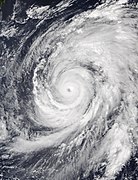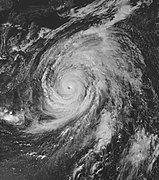Talk:Typhoon Hagibis
| This article is rated C-class on Wikipedia's content assessment scale. It is of interest to the following WikiProjects: | ||||||||||||||||||||||||||||||||||||||||||||
| ||||||||||||||||||||||||||||||||||||||||||||
Number of deaths
[edit]Fukui Shimbun(https://www.fukuishimbun.co.jp/articles/-/953170) reports deaths being 35. There's 17 persons missing. 2001:999:41:5472:D898:3146:D129:E8F4 (talk) 15:00, 13 October 2019 (UTC)
40 deaths Zoland Gamer (talk) 21:04, 13 October 2019 (UTC)
An update: NHK NEWS(https://www3.nhk.or.jp/news/html/20191012/k10012125761000.html) reports deaths being 58, with 14 persons missing.2001:999:40:6165:284F:9404:5EF4:D3C2 (talk) 13:46, 14 October 2019 (UTC)
Semi-protected edit request on 15 October 2019
[edit]This edit request to Typhoon Hagibis (2019) has been answered. Set the |answered= or |ans= parameter to no to reactivate your request. |
"Early on 12 October, a tornado struck Ichihara City, which already killed one and left two people injured.[3]"
Can someone fix this sentence? I'm not sure what the "already" part is supposed to mean and Ichihara City is not mentioned in the reference. 93.136.41.55 (talk) 11:56, 15 October 2019 (UTC)
 Not done: The page's protection level has changed since this request was placed. You should now be able to edit the page yourself. If you still seem to be unable to, please reopen the request with further details. NiciVampireHeart 15:01, 15 October 2019 (UTC)
Not done: The page's protection level has changed since this request was placed. You should now be able to edit the page yourself. If you still seem to be unable to, please reopen the request with further details. NiciVampireHeart 15:01, 15 October 2019 (UTC)
Incredible claim
[edit]The claim that Hagibis was the largest typhoon since Tip seems to be far-fetched and incredible. Please provide a reliable source to support such a claim. --JavaHurricane (talk) 01:44, 18 October 2019 (UTC)
- I've gone ahead and removed the records section. The size claim was false, and the rainfall record was false. A reporter incorrectly claimed Hagibis has the greatest 24-hour rainfall on record in Japan; however, there are at least two storms (Fran 1976 and Namtheun 2004) with greater 24-hour totals. ~ Cyclonebiskit (chat) 04:36, 18 October 2019 (UTC)
Image war
[edit]I'm sure you had seen this, but @Super Typhoon Eden:is complaining that his/her version of Typhoon Hagibis is more defined and at better quality, while mine was processed through the Polar2Grid program, and should be at 375m resolution or less. @Meow:'s image is also worth mentioning as it has broad coverage and is (maybe) much better than the two. Here is the images:
-
Previous image on the article
-
Same image, but processed through Polar2Grid program
-
The image being complained by Super Typhoon Eden
Please take action for this, considering the article a (maybe) potential competitor for the good article. - 👦 07:29, 30 October 2019 (UTC)
- I reverted User:Super Typhoon Eden again. Hagibis was better known for its pinhole eye stage than its post-ERC stage and we all know that the pinhole eye stage had a peak intensity about 20 knots higher (JMA and JTWC are dumb; we have leeway to use that reasoning since both agencies inexplicably kept it at the same intensity for many hours on end).--Jasper Deng (talk) 19:26, 21 November 2019 (UTC)
- Wrong image yet again. We're not disputing over the greyscale anymore; I've uploaded an image that features Hagibis' pinhole eye and is similar to the one currently being used.Super Typhoon EdenMessage me here! 07:35 UTC, November 22 2019
-
New image
Death toll
[edit]I propose that the death toll listed should be changed in light of information I collected from FDMA, stating that 118 were killed and 3 missing.
Pinholes do not limit intensification, in fact it's the complete opposite.
[edit]Whoever added the sentence claiming pinholes limit intensity is sorely mistaken. Pinholes are known to harold extreme changes in intensity and are often the catalyst for extreme deepening. If anyone wants to contest this, please reply below. --AVeryWiseWolfy (talk) 23:07, 28 December 2019 (UTC)
- C-Class Disaster management articles
- High-importance Disaster management articles
- C-Class Japan-related articles
- High-importance Japan-related articles
- WikiProject Japan articles
- C-Class Weather articles
- High-importance Weather articles
- C-Class Tropical cyclone articles
- High-importance Tropical cyclone articles
- WikiProject Tropical cyclones articles
- C-Class Pacific typhoon articles
- High-importance Pacific typhoon articles
- WikiProject Weather articles









